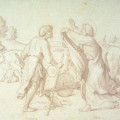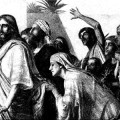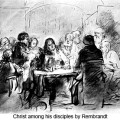Our contemporary culture seems to have an attitude that equality means we all need to be treated the same. Oddly enough, God is sometimes accused of being unfair – He doesn’t treat us all the same and some people think that just isn’t right. Of course, we all recognize that we’re not the same and we don’t make the same choices. This means we need to be treated differently by God; we need to be treated according to who we are and what we’ve chosen. However, even though God treats us differently – according to our needs – He loves us all the same. The truth is, God has an intense, unimaginable love for each and every one of us and it is because of this love that he treats us according to our needs; He treats us differently because He loves us so much and wants us to be part of His family.
The Privileges of Discipleship
23 Turning to the disciples in private he said, “Blessed are the eyes that see what you see.
24 For I say to you, many prophets and kings desired to see what you see, but did not see it, and to hear what you hear, but did not hear it.”
As we reflect on this passage it’s important for us to remember that Christ is building His Church. In this context, St. Paul’s words to the Romans and to the Corinthians are very helpful:
Many Parts in One Body (Romans 12:3-8)
For by the grace given to me I tell everyone among you not to think of himself more highly than one ought to think, but to think soberly, each according to the measure of faith that God has apportioned. For as in one body we have many parts, and all the parts do not have the same function, so we, though many, are one body in Christ and individually parts of one another. Since we have gifts that differ according to the grace given to us, let us exercise them: if prophecy, in proportion to the faith; if ministry, in ministering; if one is a teacher, in teaching; if one exhorts, in exhortation; if one contributes, in generosity; if one is over others, with diligence; if one does acts of mercy, with cheerfulness.
(Also see 1 Cor 12:12-31.)
St. Paul helps us to better see the Church as the mystical body of Christ. Clearly, a body can’t be a body if all the parts are the same. We have been carefully crafted by God differently so that we can come together and form a body. I encourage you to read the reference in 1 Corinthians chapter 12. To me, it shows that even though we are not the same, our differences don’t make any one of us greater than the others.
In today’s reflection Jesus is telling His disciples about the blessing God has given them. But we understand that this isn’t because of any special treatment. God blesses them in this way because it is fitting to who they are, and to their role in the body. Do not think of the “prophets and kings” in this pericope as someone being neglected or slighted by God. They have their authority because it has been given to them by God (See Jn 19:11 and Rom 13:1).
Like the disciples, and like the prophets, and like the kings, God has blessings for each one of us. Our gifts will be as different as we are. Like the prophets and kings in this pericope, we might want the gifts that God has chosen as a blessing for others. That doesn’t mean we aren’t blessed in our own gifts. It just means that God is blessing each and every one of us in exactly the way we need because He has a deep, intense, and abiding love for each and every one of us.
Our prayerful response can be to thank God for the blessings He has given us and to ask for the grace to embrace these blessings.
Related PostsScripture texts in this work are taken from the New American Bible, revised edition© 2010, 1991, 1986, 1970 Confraternity of Christian Doctrine, Washington, D.C. and are used by permission of the copyright owner. All Rights Reserved. No part of the New American Bible may be reproduced in any form without permission in writing from the copyright owner.





Hi, Jim. I like your blog. You are an inspiration, doing what Jesus commanded us all to do, “Go into the whole world and proclaim the gospel to every creature.” Thank you for your witness. Mike